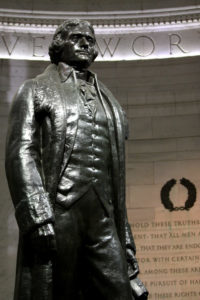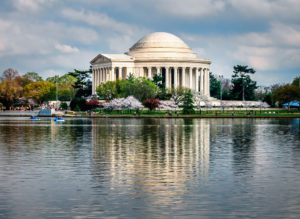Judging History
“We hold these truths to be self-evident, that all men are created equal,
that they are endowed by their Creator with certain unalienable Rights,
that among these are Life, Liberty and the pursuit of Happiness.–
That to secure these rights, Governments are instituted among Men,
deriving their just powers from the consent of the governed.”
– Thomas Jefferson (1743-1826), from “The Declaration of Independence” (1776)
 I know from the emails I receive that our readership is worldwide. I never could have imagined that one day I would have friends in almost every country on earth! So I understand that this post which is aimed at Americans is going to disappoint some readers. I apologize, but it’s time for a bit of much-needed in-country shop-talk. Too many Americans have come to take for granted the government that was established some 230 years ago by a generation of giants so sensible and altruistic, so wise and so far-seeing that in a nation controlled by what is now the world’s oldest continuing government, we take our precious freedoms for granted. We can speak our minds and earn and keep our own wealth, and we go to bed peacefully each night under the protection and not under the boot of our government! But these gifts from our Founding Fathers have become just the water in which we swim. Not only do we take all our freedoms for granted, but we feel free to attack the long-dead authors of this brilliant experiment in citizen government. It makes sense to far too many Americans to call them out for the sin of not having lived by our twenty-first-century standards. How infantile this is! How inexcusably childish! And how dangerous it is for those who take for granted the incomparable worth of their daily freedoms to play at weakening the once-solid pillars of this nation.
I know from the emails I receive that our readership is worldwide. I never could have imagined that one day I would have friends in almost every country on earth! So I understand that this post which is aimed at Americans is going to disappoint some readers. I apologize, but it’s time for a bit of much-needed in-country shop-talk. Too many Americans have come to take for granted the government that was established some 230 years ago by a generation of giants so sensible and altruistic, so wise and so far-seeing that in a nation controlled by what is now the world’s oldest continuing government, we take our precious freedoms for granted. We can speak our minds and earn and keep our own wealth, and we go to bed peacefully each night under the protection and not under the boot of our government! But these gifts from our Founding Fathers have become just the water in which we swim. Not only do we take all our freedoms for granted, but we feel free to attack the long-dead authors of this brilliant experiment in citizen government. It makes sense to far too many Americans to call them out for the sin of not having lived by our twenty-first-century standards. How infantile this is! How inexcusably childish! And how dangerous it is for those who take for granted the incomparable worth of their daily freedoms to play at weakening the once-solid pillars of this nation.
Regular readers here know that I have a special fondness for Thomas Jefferson. The man was a polymath, a profound thinker and a prolific writer. He was barely 33 years old when he became the primary author of the American Declaration of Independence, which is the intellectual grounding of this whole experiment in freedom and self-government. And besides being one of the fathers of the American experiment, Thomas Jefferson was the primary founding American President. He pioneered the establishment of our coast-to-coast country with the Louisiana Purchase and the Lewis & Clark expedition, and he established this young nation as a world policeman when he fought the Tripolitan War and ended the piracy that had resulted in the enslavement of more than a million Europeans on the North African coast. He gave his life to the establishment of this country, from serving as a Governor of Virginia during the Revolutionary War through his long diplomacy in Paris and his service as the first Secretary of State and the second Vice President of the United States before he became this nation’s third President. If George Washington was the father of his country, then Thomas Jefferson was its doting uncle. So the fact that in this barbaric age his failure to also abolish slavery is held against him to such an extent that some see it as negating the value of his service is a shame on us that must be called out.
 I have a dear friend who is a professional historian. The only time that he and I ever butt heads is when he shares with me something he has written about the fact that Thomas Jefferson never freed his slaves. My friend calls his complaint a legitimate gripe, while I see it as a clueless demand that people who lived centuries ago had to have possessed all our modern knowledge and sensibilities or else everything they did for us is tainted and worthless. To me, that is not doing history! How is it possible to understand the actions of anyone, living or dead, without at least making some attempt to empathize with the way that person sees the world, what he actually knows, and his motivations? I have written here about Jefferson’s attitudes toward slavery and race, the Sally Hemings question, and the precise parity that exists between slavery in Jefferson’s day and abortion in ours, so we need not rehash any of that here. I only would say that until you have done enough research to be able to write about any historical figure with empathetic understanding, you have no business writing about him at all.
I have a dear friend who is a professional historian. The only time that he and I ever butt heads is when he shares with me something he has written about the fact that Thomas Jefferson never freed his slaves. My friend calls his complaint a legitimate gripe, while I see it as a clueless demand that people who lived centuries ago had to have possessed all our modern knowledge and sensibilities or else everything they did for us is tainted and worthless. To me, that is not doing history! How is it possible to understand the actions of anyone, living or dead, without at least making some attempt to empathize with the way that person sees the world, what he actually knows, and his motivations? I have written here about Jefferson’s attitudes toward slavery and race, the Sally Hemings question, and the precise parity that exists between slavery in Jefferson’s day and abortion in ours, so we need not rehash any of that here. I only would say that until you have done enough research to be able to write about any historical figure with empathetic understanding, you have no business writing about him at all.
We know what Jesus said about judgment. He said, “Do not judge, and you will not be judged; and do not condemn, and you will not be condemned; pardon, and you will be pardoned.” (LK 6:37). Even more pertinently, He also said, “Why do you look at the speck that is in your brother’s eye, but do not notice the log that is in your own eye? How can you say to your brother, ‘Brother, let me take out the speck that is in your eye,’ when you yourself do not see the log that is in your own eye? You hypocrite, first take the log out of your own eye, and then you will see clearly to take out the speck that is in your brother’s eye” (LK 6:41-42).
The logs in our modern eyes are as thick as a forest! And the coincidence of the removal of a Jefferson statue from New York City Hall just as oral arguments about an abortion case are happening before the United States Supreme Court gives us a useful opportunity for some self-education.
 For those not familiar with the American system, our Supreme Court’s role is to interpret and enforce the U.S. Constitution. And that’s it! The Supreme Court does not and cannot make laws. That’s Congress’s role. But the rights enumerated in the Constitution must be safeguarded as the bedrock of our precious freedoms, and for that we need a Supreme Court that won’t interpret the Constitution according to changing cultural whims. If the Constitution itself ever needs to be changed, there is a careful process for that. Still, Supreme Court Justices are human beings with personal opinions, and their temptation to bend the rules according to prevailing cultural winds is strong. Which is why we sometimes get truly appalling judge-made laws like these:
For those not familiar with the American system, our Supreme Court’s role is to interpret and enforce the U.S. Constitution. And that’s it! The Supreme Court does not and cannot make laws. That’s Congress’s role. But the rights enumerated in the Constitution must be safeguarded as the bedrock of our precious freedoms, and for that we need a Supreme Court that won’t interpret the Constitution according to changing cultural whims. If the Constitution itself ever needs to be changed, there is a careful process for that. Still, Supreme Court Justices are human beings with personal opinions, and their temptation to bend the rules according to prevailing cultural winds is strong. Which is why we sometimes get truly appalling judge-made laws like these:
 Roe is an example of judge-made law by a Supreme Court under cultural pressure, just as was Dred Scott a century before. And like Dred Scott, it treats the lives of two human beings as if one is more important than the other simply because one is more powerful than the other, which was what I argued as a law student. But just like antebellum Southerners trying to keep their power over their slaves, my fellow law students shouted me down. So I felt somewhat vindicated this past week when Justice Kavanaugh said something similar during the oral arguments on possibly overturning Roe. Justice Kavanaugh pointed out how hard it is to do what Roe tried to do, which is to balance the interests of the mother and the child. “You can’t accommodate both interests. You have to pick. That’s the fundamental problem. And one interest has to prevail over the other at any given point in time. And that’s why this is so challenging.”
Roe is an example of judge-made law by a Supreme Court under cultural pressure, just as was Dred Scott a century before. And like Dred Scott, it treats the lives of two human beings as if one is more important than the other simply because one is more powerful than the other, which was what I argued as a law student. But just like antebellum Southerners trying to keep their power over their slaves, my fellow law students shouted me down. So I felt somewhat vindicated this past week when Justice Kavanaugh said something similar during the oral arguments on possibly overturning Roe. Justice Kavanaugh pointed out how hard it is to do what Roe tried to do, which is to balance the interests of the mother and the child. “You can’t accommodate both interests. You have to pick. That’s the fundamental problem. And one interest has to prevail over the other at any given point in time. And that’s why this is so challenging.”
Yep. It’s challenging. And it’s dangerous. The United States Constitution is a brilliant blueprint for a government of checks and balances that can truly be of, by, and for the people being governed. This was a radical idea two hundred and fifty years ago! And Dred Scott and Roe illustrate for us just how precious and how fragile our government-protected rights still are. All those freedoms that we take for granted could be lost in a single instance of bad Supreme Court judge-made law, just as the right to citizenship of people held in slavery was arbitrarily taken away in the prelude to the Civil War, and the right to life of people who were still in gestation was stomped when sexual freedom became the current fashion. There is an odd flirtation with collectivist government going on now in the United States. If that sentiment builds, and if sufficient people become enamored of some charismatic leader who will take care of us so we won’t need to work and we all can just play videogames, then what is there to prevent some future Supreme Court from finding that the Constitution contains a right of the president to require all citizens to give up their basic rights for the greater good of the nation, just as Roe took away the rights of fetuses to be protected in utero for the greater good of the mother? The truth is, there is no protection at all.
 The only way we can protect the rights and freedoms that were so brilliantly crafted by this nation’s founders is to support the processes that they set in place for the maintenance and protection of those rights. When Roe falls, as it must, it will be up to the people of each state in their own legislatures to decide when and to what extent the rights of the mother override the rights of the child. And if your own rights matter to you, then you will applaud that result.
The only way we can protect the rights and freedoms that were so brilliantly crafted by this nation’s founders is to support the processes that they set in place for the maintenance and protection of those rights. When Roe falls, as it must, it will be up to the people of each state in their own legislatures to decide when and to what extent the rights of the mother override the rights of the child. And if your own rights matter to you, then you will applaud that result.
Thomas Jefferson hated slavery. He began his public life with a determination to find a way to end it, and in fact his first draft of the Declaration of Independence called out Britain’s introduction of slavery here as one of its greatest crimes against the American colonies. But when his wife died at the age of 33, he was so bereft that he spent much of the rest of his life living away from the problem, returning to Virginia to live only in old age.
Having studied Thomas Jefferson extensively, I can attest that he was a thoroughly good man. He didn’t end slavery because he couldn’t end slavery, and meanwhile he protected his slaves while he waited for a safer and more stable time to free them… then unfortunately, his death intervened. And on the other hand, his service to this nation and to the freedom and elevation of all of humankind is almost without parallel. When we  attack a primary author of the American experiment for having been a man of his time, we show ourselves to be clueless philistines. And we place at risk every one of the advances in human freedom and understanding that he helped to foster. For the sake of our children and their children’s children, it is time for all Americans to grow up.
attack a primary author of the American experiment for having been a man of his time, we show ourselves to be clueless philistines. And we place at risk every one of the advances in human freedom and understanding that he helped to foster. For the sake of our children and their children’s children, it is time for all Americans to grow up.
“We the People of the United States,
in Order to form a more perfect Union, establish Justice,
insure domestic Tranquility, provide for the common defense,
promote the general Welfare, and secure the Blessings of Liberty
to ourselves and our Posterity, do ordain and establish
this Constitution for the United States of America.”
– The People in Congress Assembled, the Preamble to the U.S. Constitution (1789)
The post Judging History appeared first on Roberta Grimes.



